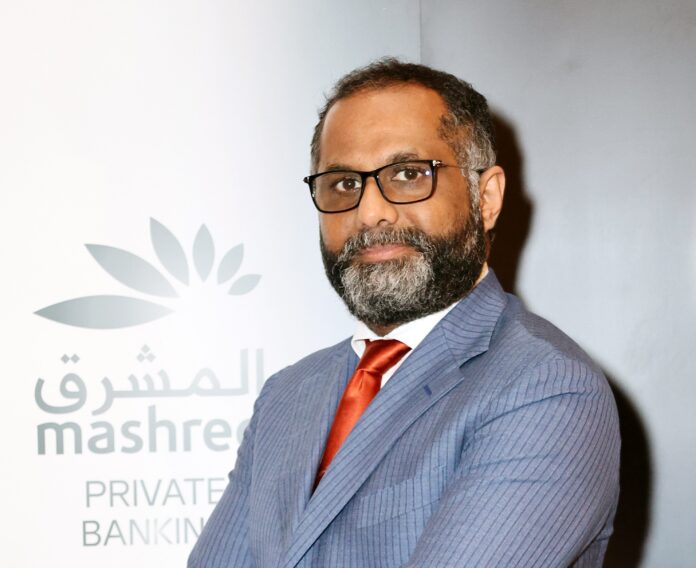Addressing the nature of family office and succession planning in the region, Biju Thomas, Senior Director, Private Banking at Mashreq explains the challenges and strategies being adopted by those managing and advising wealthy families in the Middle East.
What is your definition of a Family Office in the Middle East?
As a leading financial institution headquartered in the GCC region, family-run businesses are pivotal to our growth and success. These families have traditionally relied upon the expertise of high-ranking wealth management professionals when seeking guidance regarding personal wealth management, investments and financial requirements. In this scenario, our Corporate Banking division is actively engaged in lending and offering investment solutions to such enterprises.
Over time, the increase in wealth accumulation, the younger generations’ exposure to international education and the complexities of succession planning prompted the establishment of Family Offices. From our perspective, Family Offices comprise a spectrum of diligently operated investment vehicles led by seasoned professionals who are entrusted with the responsibility of managing and sustaining family wealth across generations.
Family Offices in the Middle East differ from traditional wealth management firms as they are designed to meet the unique needs and objectives of affluent families. They offer customised solutions and personalised services that go beyond the conventional, including investment management, estate planning, tax planning, philanthropic planning and risk management. In addition, they may also provide concierge services such as travel arrangements, security and other personalised assistance.
What are the current needs and challenges of family offices operating in the region?
Family Offices in the region encompass a wide spectrum, from entities managing the personal investment portfolio of royal families, with a workforce of few thousand employees and managing billions in wealth, to smaller teams of investment specialists relying on their CEO/CFO for investments. The current needs and challenges of such organisations include:
- Wealth Preservation and Growth: While the primary requirement, for most High and Ultra High Net Worth Individuals is the preservation and growth of wealth for future generations, they also seek alternatives to business dividends in order to differentiate corporate strategies from personal income.
- Succession Planning: Family Offices often prioritise the seamless transfer of assets and management responsibilities across generations, ensuring the continuity of wealth. This becomes particularly crucial in the case of extended families where the focus expands to encompass a wider range of members.
- Governance and Risk Management: To navigate the intricate interplay between family dynamics, investment choices and business interests, Family Offices establish robust governance structures. They must ensure effective compliance with regulations to safeguard the wealth of their clients.
- Talent Management: Family Offices rely on competent professionals to manage their investments, operations and relationships, while attracting and retaining top talent remains a key challenge.
- Social Responsibility: Several families are dedicated to fulfilling their social responsibilities and engaging in philanthropic endeavors, while utilising their wealth to create a positive impact on society, taking into consideration that balancing their financial objectives creates a complex challenge.
Approximately only a quarter of the regions’ HNWIs have adequate succession planning. Are Family offices addressing this concern?
HNWIs often have complex family and business structures, which can make succession planning challenging. However, many of them recognise its importance and take the necessary steps to ensure a smooth transition of wealth and assets.
The establishment of Family Offices itself aims to manage wealth and establish processes independent of excessive influence from family members. Working closely with families, they collaborate to design a comprehensive succession plan aligned with the family’s goals, values and unique circumstances.
One effective approach involves the implementation of strategies such as placing assets in trusts or foundations. More recently, family wealth has been invested in fund structures that facilitate easy distribution of income and ensure smooth transitions when selling holdings.
While there is no one-size-fits-all solution, many Family Offices are actively addressing concerns related to succession planning to ensure a seamless transfer of wealth and assets to future generations.
How has the ending of the era of low interest rates affected strategic asset allocations?
2023 comes at a defining moment in time, with the end of the era of low or negative nominal interest rates, and the ample liquidity that followed the global financial crisis. With interest rates on the rise, traditional asset allocation models that worked well in the past may no longer be relevant now.
One approach being actively embraced involves the allocation of funds towards alternative investments such as private equity, real estate and hedge funds as they tend to be less impacted by fluctuations in interest rates and can offer diversification benefits.
Another strategy involves increasing allocations to fixed-income assets with shorter maturities, given that they are less sensitive to changes in long-term interest rates.
Moreover, UHNWIs may need to reassess their investment objectives and risk tolerance, which includes adjusting target returns, reevaluating portfolio diversification strategies and exploring previously unconsidered asset classes.
The conclusion of the era of low interest rates presents new challenges, and at the same time brings forth new opportunities, where adopting a flexible and dynamic approach can ensure fruitful outcomes.
Are current geo-political circumstances and climate related concerns changing patterns of investment?
Due to the challenging global environment, geopolitics is now the top concern for Family Offices. While most still have almost half of their assets in North America, they are keen on boosting allocations to Western Europe for the first time in several years. Additionally, they are planning to raise and broaden allocations to the wider Asia-Pacific region.
In addition to geopolitical factors, climate-related concerns are increasingly re-shaping investment strategies. Urgent issues such as greenhouse gas emissions and climate change impacts have led investors to prioritise companies adopting climate solutions, such as renewable energy, energy efficiency and sustainable agriculture. Some investors are also divesting from fossil fuel-intensive industries or companies that aren’t taking sufficient measures to reduce their carbon footprint.
It’s worth noting that, in some instances, geopolitical circumstances and climate-related concerns are further complicating the investment landscape. For example, the transition to a low-carbon economy may be influenced by geopolitical tensions surrounding access to critical minerals needed for renewable energy technologies. Similarly, climate change impacts like sea level rise and extreme weather events can contribute to geopolitical risks through resource scarcity or social unrest.
How is the increasing role of technology changing family office services?
The swift advancements in technology have allowed family offices to harness their potential for optimising their operations, enriching their services and boosting overall efficiency. Utilising software tools that offer real-time financial data, automate mundane tasks and enable comprehensive investment analysis and reporting, family offices can make well-informed investment decisions, identify potential risks, and optimise their portfolios.
Furthermore, it enhances transparency and communication between family offices and their clients, enabling the latter to gain real-time access to financial information, investment performance and various services through web portals and mobile applications.











